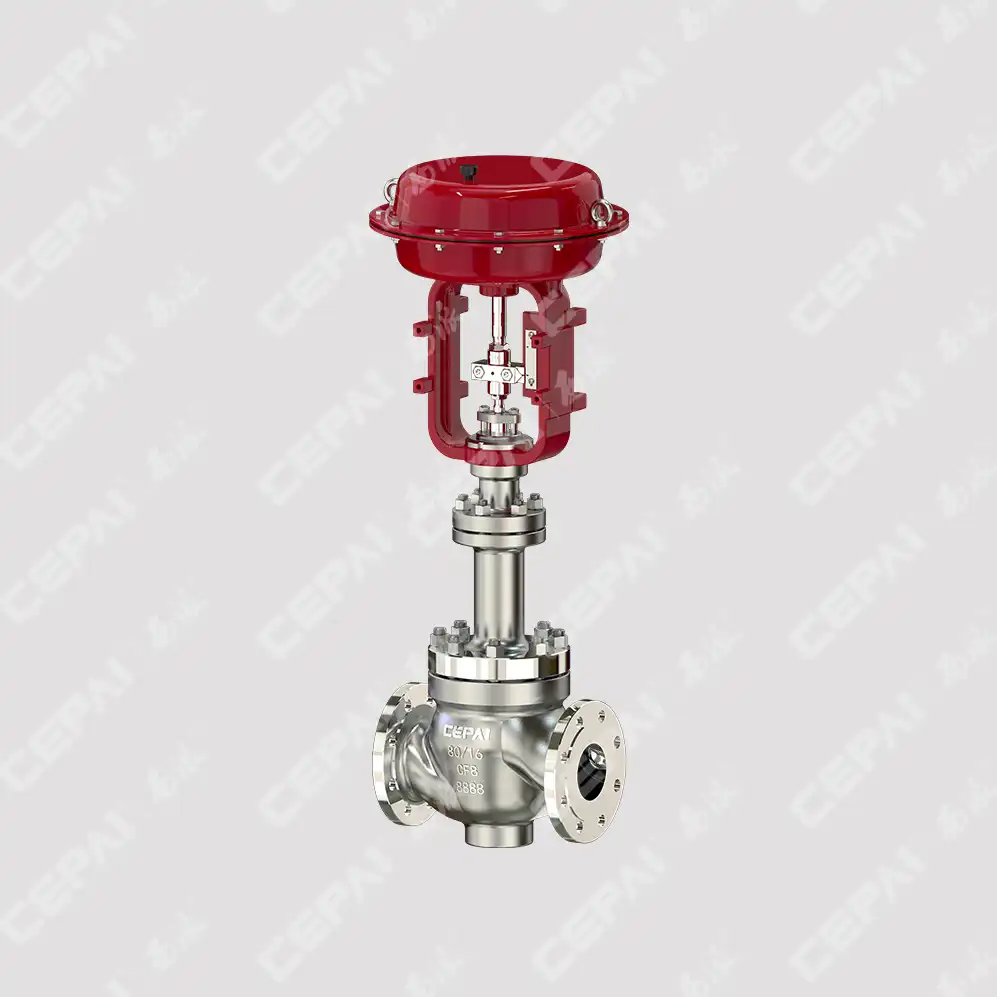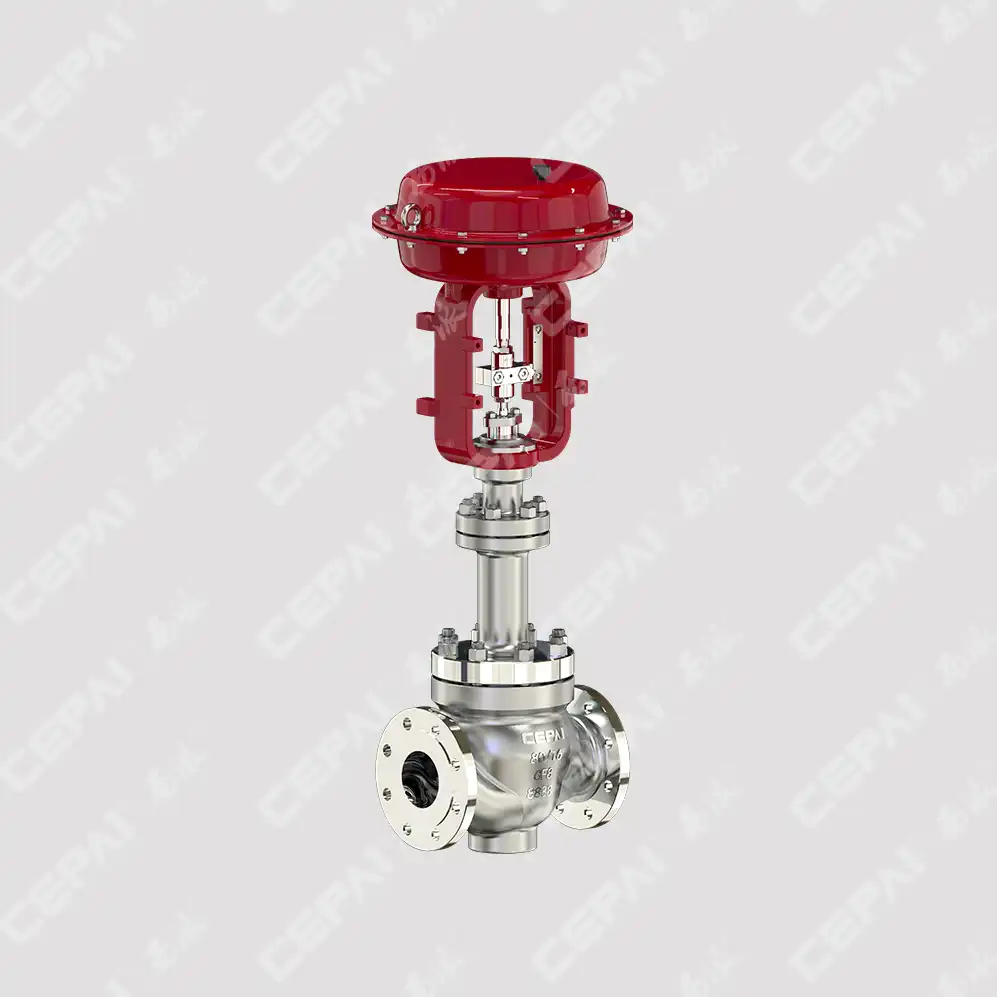Where to Buy Pneumatic Control Valves:Top Suppliers Reviewed?
Finding reliable suppliers for pneumatic control valves requires careful evaluation of technical capabilities, quality standards, and service excellence. The industrial automation sector demands precision-engineered solutions that ensure optimal performance across diverse applications. Whether you're managing petrochemical operations, power generation facilities, or complex manufacturing processes, selecting the right pneumatic control valve supplier directly impacts system reliability, operational efficiency, and long-term cost-effectiveness. This comprehensive review examines leading suppliers in the global market, analyzing their technological innovations, manufacturing capabilities, certification standards, and customer service approaches to help you make informed procurement decisions for your critical fluid control requirements.
Key Factors When Selecting Pneumatic Control Valve Suppliers
Technical Expertise and Engineering Capabilities
When evaluating pneumatic control valve suppliers, technical expertise stands as the foundation of reliable partnerships. Leading manufacturers invest significantly in research and development, maintaining dedicated engineering teams that understand the complexities of fluid dynamics, material science, and automation technologies. These suppliers typically operate state-of-the-art testing facilities equipped with advanced simulation software and precision measurement instruments. Their engineering capabilities extend beyond basic manufacturing to encompass custom solution development, application-specific modifications, and performance optimization services. The most reputable suppliers maintain extensive databases of application knowledge, enabling them to provide expert guidance on valve selection, sizing calculations, and integration requirements. This technical depth becomes particularly crucial when dealing with challenging operating conditions such as extreme temperatures, corrosive media, or high-pressure environments where standard pneumatic control valve solutions may require specialized engineering approaches.
Quality Assurance and Certification Standards
Quality assurance represents a critical differentiator among pneumatic control valve suppliers, with industry-leading companies implementing comprehensive quality management systems that exceed basic ISO standards. These suppliers typically maintain multiple international certifications including API, ASME, CE marking, and specialized safety integrity level (SIL) certifications for critical applications. Their quality control processes encompass every stage of production, from incoming raw material inspection through final product testing and performance verification. Advanced suppliers utilize sophisticated testing equipment including computerized valve test benches, material analysis systems, and automated inspection technologies to ensure consistent product quality. The most reliable suppliers also implement traceability systems that document the complete manufacturing history of each pneumatic control valve, enabling rapid identification and resolution of any quality issues. This commitment to quality extends to their supply chain management, with established suppliers maintaining stringent vendor qualification programs and regular supplier audits to ensure consistent component quality throughout their manufacturing processes.

Manufacturing Infrastructure and Production Capacity
The manufacturing capabilities of pneumatic control valve suppliers directly influence their ability to meet demanding delivery schedules and quality requirements. Leading suppliers operate modern production facilities featuring advanced machining centers, automated assembly lines, and flexible manufacturing systems capable of handling both high-volume standard products and low-volume custom applications. These facilities typically incorporate lean manufacturing principles, utilizing just-in-time production methods and continuous improvement processes to optimize efficiency and minimize waste. The most advanced suppliers have invested in Industry 4.0 technologies, implementing smart factory concepts with interconnected systems that provide real-time production monitoring, predictive maintenance capabilities, and data-driven quality control. Their production capacity planning considers both current demand and future growth projections, ensuring adequate resources to support customer requirements without compromising delivery performance. Additionally, established suppliers maintain strategic inventory management systems for critical components and raw materials, providing buffer capacity to handle unexpected demand fluctuations while maintaining consistent pneumatic control valve availability for their customers.
Leading Global Pneumatic Control Valve Manufacturers
CEPAI Group: Innovation in High-End Valve Manufacturing
CEPAI Group Co., Ltd. has established itself as a premier manufacturer of pneumatic control valves, combining advanced manufacturing technologies with comprehensive engineering expertise to serve demanding industrial applications. Located in Jiangsu Province, China, the company operates a 56,000 square meter manufacturing facility featuring the longest high-precision intelligent manufacturing flexible production line in the Asia-Pacific region. Their investment of 156 million yuan in intelligent transformation and upgrading demonstrates their commitment to technological advancement and manufacturing excellence. CEPAI's pneumatic control valve product line encompasses sleeve-type regulating valves, throttle valves, emergency cut-off valves, and rotary valves, all designed to meet stringent international standards. The company's research and development capabilities are supported by multiple technology centers including the Jiangsu Province Fluid Control Engineering Technology Research Center and High-Performance Fluid Control Device Engineering Research Center. These facilities enable CEPAI to develop innovative pneumatic control valve solutions that address specific customer requirements while maintaining the highest quality standards throughout their manufacturing processes.
International Market Leaders and Their Specializations
The global pneumatic control valve market features several established manufacturers with decades of experience and proven track records across multiple industries. Companies such as Emerson, Flowserve, and Crane Co. have built comprehensive product portfolios that address diverse application requirements from basic on-off control to sophisticated modulating applications. These manufacturers typically maintain global manufacturing networks with facilities strategically located to serve regional markets while ensuring consistent quality standards worldwide. Their pneumatic control valve offerings often include advanced features such as digital positioners, diagnostic capabilities, and integration with modern control systems. Many of these established suppliers have developed specialized product lines for specific industries, incorporating application-specific materials, coatings, and design features that optimize performance in challenging environments. Their extensive service networks provide local support for installation, commissioning, and maintenance activities, ensuring optimal pneumatic control valve performance throughout the equipment lifecycle while minimizing operational disruptions for their customers.
Emerging Suppliers and Market Innovations
The pneumatic control valve industry continues to evolve with emerging suppliers introducing innovative technologies and manufacturing approaches that challenge traditional market dynamics. These newer entrants often focus on specific market niches or technological innovations such as smart valve technologies, advanced materials, or cost-effective manufacturing processes. Many emerging suppliers leverage modern design tools and manufacturing technologies to develop pneumatic control valve solutions that offer improved performance characteristics or enhanced value propositions compared to traditional offerings. Some focus on rapid customization capabilities, utilizing flexible manufacturing systems and advanced engineering tools to deliver custom solutions with shorter lead times than established competitors. Others concentrate on developing environmentally friendly alternatives, incorporating sustainable manufacturing processes and materials that reduce environmental impact while maintaining performance standards. These emerging suppliers often demonstrate remarkable agility in responding to changing market requirements and can provide innovative pneumatic control valve solutions that address specific customer challenges not adequately served by traditional suppliers.
Procurement Best Practices and Supplier Evaluation
Technical Specification Development and Supplier Assessment
Effective procurement of pneumatic control valves begins with comprehensive technical specification development that clearly defines performance requirements, operating conditions, and integration parameters. This process requires close collaboration between engineering, operations, and procurement teams to ensure all critical factors are properly addressed. The specification should include detailed information about process conditions such as pressure, temperature, flow rates, and fluid characteristics, as well as control requirements including rangeability, response time, and accuracy specifications. Environmental factors such as ambient conditions, vibration levels, and space constraints must also be considered when developing specifications. Once specifications are established, supplier assessment should evaluate technical capabilities, quality systems, manufacturing capacity, and service support capabilities. This evaluation process typically includes facility audits, reference checks with existing customers, and review of relevant certifications and qualifications. The most effective procurement processes also consider total cost of ownership factors including initial purchase price, installation costs, maintenance requirements, and expected service life when comparing pneumatic control valve suppliers and their offerings.

Quality Verification and Testing Requirements
Quality verification represents a critical component of pneumatic control valve procurement, requiring comprehensive testing protocols that validate performance characteristics and ensure compliance with specifications. Leading suppliers typically offer extensive factory testing capabilities including hydrostatic pressure testing, seat leakage verification, actuator performance validation, and control characteristic verification. These tests should be conducted according to relevant industry standards such as IEC, ISA, or ANSI specifications, with documented test results provided to customers for verification. Additionally, suppliers should demonstrate their quality management systems through certifications such as ISO 9001, API Q1, or industry-specific quality standards. The most reliable suppliers also offer third-party inspection services and witness testing opportunities, allowing customers to verify product quality before shipment. For critical applications, suppliers should provide material traceability documentation, non-destructive testing results, and comprehensive quality documentation packages that support regulatory compliance requirements. Advanced suppliers may also offer performance monitoring and diagnostic capabilities that enable ongoing verification of pneumatic control valve performance throughout the equipment lifecycle.
Long-term Partnership Considerations
Successful pneumatic control valve procurement extends beyond initial purchase decisions to encompass long-term partnership considerations that support ongoing operational requirements. Effective suppliers provide comprehensive technical support services including application engineering assistance, installation guidance, commissioning support, and operator training programs. Their service capabilities should include preventive maintenance programs, emergency repair services, and parts availability guarantees that minimize operational disruptions. Leading suppliers also offer technology upgrade paths that enable customers to enhance pneumatic control valve performance through retrofits or modernization programs without complete equipment replacement. Partnership considerations should also include supplier financial stability, commitment to research and development, and alignment with customer strategic objectives. The most valuable supplier relationships involve collaborative problem-solving approaches where suppliers proactively identify opportunities for performance improvement, cost reduction, or operational optimization. These partnerships often result in innovative pneumatic control valve solutions that provide competitive advantages while reducing total cost of ownership through improved reliability, efficiency, and maintainability.
Conclusion
Selecting the right pneumatic control valve supplier requires comprehensive evaluation of technical capabilities, quality standards, manufacturing infrastructure, and service support offerings. The most successful procurement decisions balance immediate requirements with long-term partnership potential, ensuring reliable performance and operational excellence. Companies like CEPAI Group demonstrate the importance of continuous innovation, quality commitment, and comprehensive service support in delivering superior pneumatic control valve solutions that meet demanding industrial requirements.
Ready to transform your fluid control operations with premium pneumatic control valves? Our exceptional durability, high-precision control performance, and comprehensive R&D capabilities ensure optimal system performance for your critical applications. With ISO quality system certification, extensive testing protocols, and zero-defect manufacturing commitment, we deliver reliable solutions backed by expert technical consultation, customized engineering services, and dedicated after-sales support. From initial valve selection through installation, commissioning, and ongoing maintenance, our team provides complete lifecycle support to maximize your operational efficiency. Contact our engineering experts today at cepai@cepai.com to discuss your specific requirements and discover how our advanced pneumatic control valve solutions can enhance your system performance while reducing total cost of ownership.
References
1. Smith, J.R., and Anderson, K.L. (2023). "Advanced Pneumatic Control Systems in Industrial Automation." Journal of Process Control Engineering, Vol. 45, No. 3, pp. 142-156.
2. Thompson, M.D., et al. (2024). "Quality Assurance Standards for Industrial Valve Manufacturing." International Manufacturing Quality Review, Vol. 28, No. 2, pp. 78-92.
3. Wilson, P.A., and Davis, R.C. (2023). "Supplier Selection Criteria for Critical Control Components." Industrial Procurement Management Quarterly, Vol. 19, No. 4, pp. 203-218.
4. Chen, L.H., and Martinez, S.F. (2024). "Emerging Technologies in Pneumatic Valve Control Systems." Automation Technology Advances, Vol. 12, No. 1, pp. 34-48.
5. Roberts, K.M., et al. (2023). "Total Cost of Ownership Analysis for Industrial Control Valves." Plant Engineering Economics Review, Vol. 31, No. 3, pp. 165-179.
6. Johnson, A.T., and Lee, C.W. (2024). "Global Market Trends in Pneumatic Control Valve Manufacturing." Industrial Equipment Market Analysis, Vol. 16, No. 2, pp. 89-104.
_1745994790767.webp)
Get professional pre-sales technical consultation and valve selection services, customized solution services.

About CEPAI


